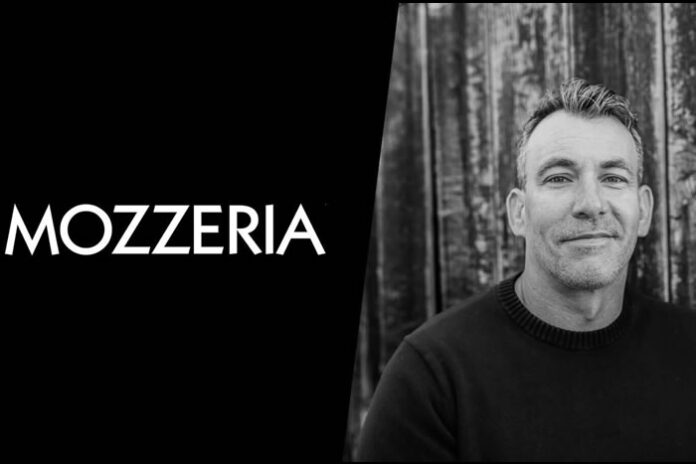In a world where disabled people are burdened with asking for an equity experience at every turn, Richard Horrell’s insistence on Universal Design is bold indeed. Then again, everything about him is bold. Tall, serious and seriously fit, he incongruently wears blue nail polish, and from the moment he gets off his Harley Davidson motorcycle, he exudes competence and intelligence.
Burgeoning Deaf-run business
Richard Horrell, J.D. is the CEO of Mozzeria, a successful Deaf-owned and Deaf-run business. “Mozzeria serves authentic, wood-fired, Neapolitan pizza in Washington, DC and San Francisco, and is expanding into Sonoma County this summer. It is built on the foundational belief that Deaf and hard-of-hearing people are capable of leadership, innovation, creativity, and success. At Mozzeria, the whole team is Deaf/hard of hearing and communicates in ASL; giving hearing people an equity experience to remember.
“Rather than apologizing and asking for access, we just assert that it is a given,” he says. “Likewise, we make our culture accessible to hearing customers, thereby modeling to them how to engage meaningfully with diverse communicators.” To truly understand the multi-faceted beauty of Mozzeria, you must experience it first-hand.
Horrell is also the board president of Community Action Partnership of Sonoma, one of the most successful non-profit organizations in the North Bay, owner of Big Bully Roasters, a local coffee roasting company, and an adjunct law professor.
Who is the interpreter there for?
He is hard of hearing and I am Deaf, and we easily converse in American Sign Language (ASL). Since my book, The Butterfly Cage about a 13-year career teaching Deaf students was recently released, and publicity is underway, I pick his brain about navigating the often tricky waters of access in the public eye, to always give an equity experience. He explains how he uses an interpreter when discussing Deaf topics, partly for access and partly in solidarity with his community. Horrell was interviewed by iHeartRadio that morning using an interpreter where he told the interviewers, “This is our interpreter, not my interpreter. They provide hearing people access to us just as much as they do the reverse.”
His describes how he lives by the principals of Universal Design across multiple settings. “Anyone who comes into our businesses, classrooms, or offices, should feel like ‘this is designed for me.’ While access is the minimum—belonging is the goal.” I’ve personally been on the receiving end of the question of who exactly is entitled to access, when I’ve tried to attend a public event I was enthralled about, and was denied interpreters. What places one human being’s value above another’s?
Profit margins versus making a difference
Speaking with Richard, one comes away with a lot more than an answer to that question. They get a glimpse into his radical re-framing of the usual business-owner script. “Authority is rooted in power and privilege and access to power and privilege,” he says. “I think, beyond profit margins and growth points and all the usual trappings of capitalism that when we are only focused on money, we will miss the bigger impact we can have.”
In the Deaf community, many face discrimination in the work-place and struggle to find employment, and a true equity experience. Seeing others succeed is important to our sense of what is possible. “Too often, Deaf people are not recognized as the experts in the room. We are seen only as students,” Richard said, “but we are teachers as well. We’re seen as clients or customers, but we’re professionals too.” And in his case, some are CEO’s.
Who are really the experts?
Our conversation meanders to different places where providing access has been casually, unintentionally, overlooked. “I’m not going to beg for scraps,’ Richard says. “I’m the expert in the room.” I think back to all the times I was the Deaf expert in the room, in my student’s IEP meetings, yet had to fight for the respect that should have engendered. And I think of my very bright student’s often shockingly low language levels, impacted by misleading information their parents got from specialists. That’s why we look for the equity experience. These professionals, all hearing, told parents to focus on speech and listening devices rather than expose them to ASL or Deaf culture.
“If someone goes to Mozzeria and then later has a Deaf baby,” Richard explains, “they will have a positive memory of the Deaf excellence they witnessed there and that could powerfully impact the life they provide for that deaf child.” I imagine the parents facing their new reality confidently, instead of the usual prolonged shock, grief and fear that accompanies a Deaf diagnosis.
When Richard describes his early life, as a high school drop-out, I ask if he thought he’d be where he is in life, if he were not Deaf. I already have my own opinion of this, but I’m curious too. “I probably would have died in the army in Iraq or Afghanistan, if I was hearing and enlisted,” he says. “Absolutely, 100%, I am where I am in life, not in spite of being Deaf, but because I am.” I nod. While the details are different in my case, I feel the same; being Deaf gave me depth, innovativeness, direction I wouldn’t have otherwise, and has connected me to some incredible people. Richard Horrell is one of them.
















